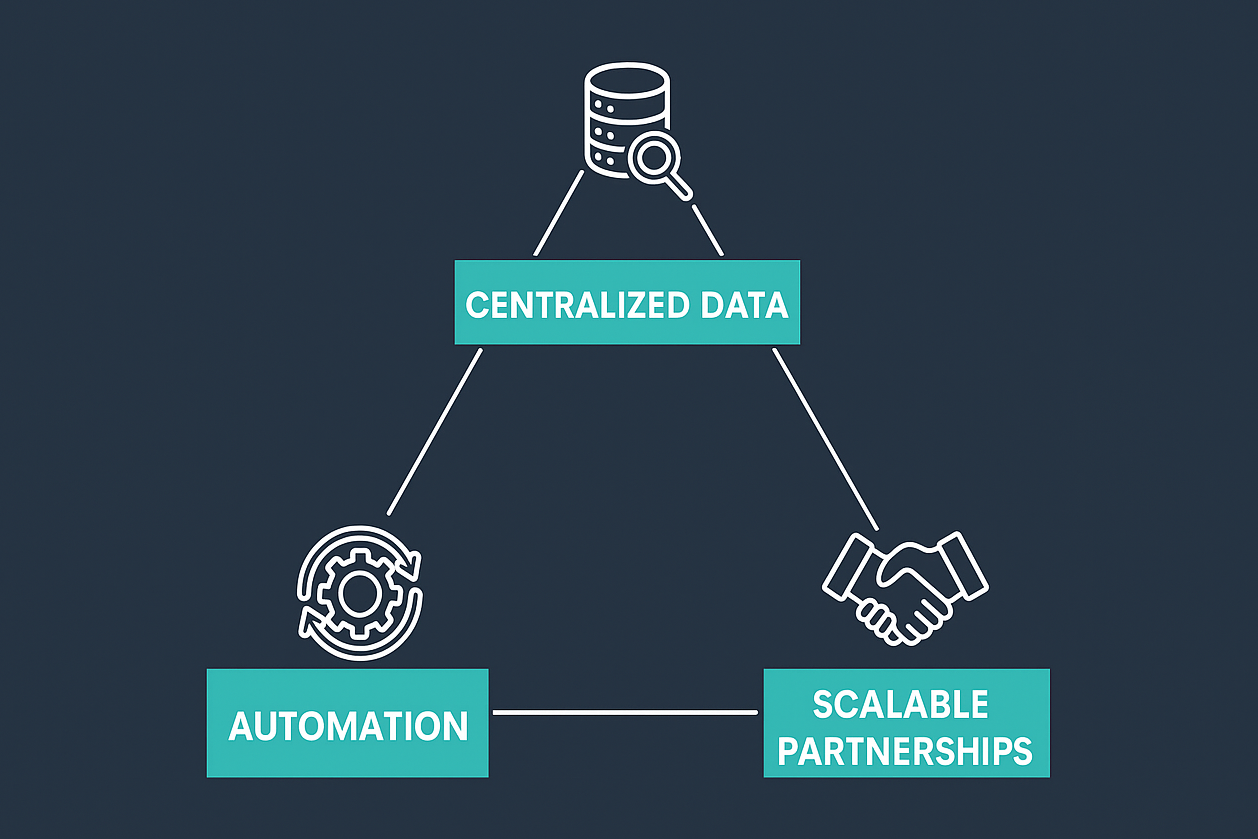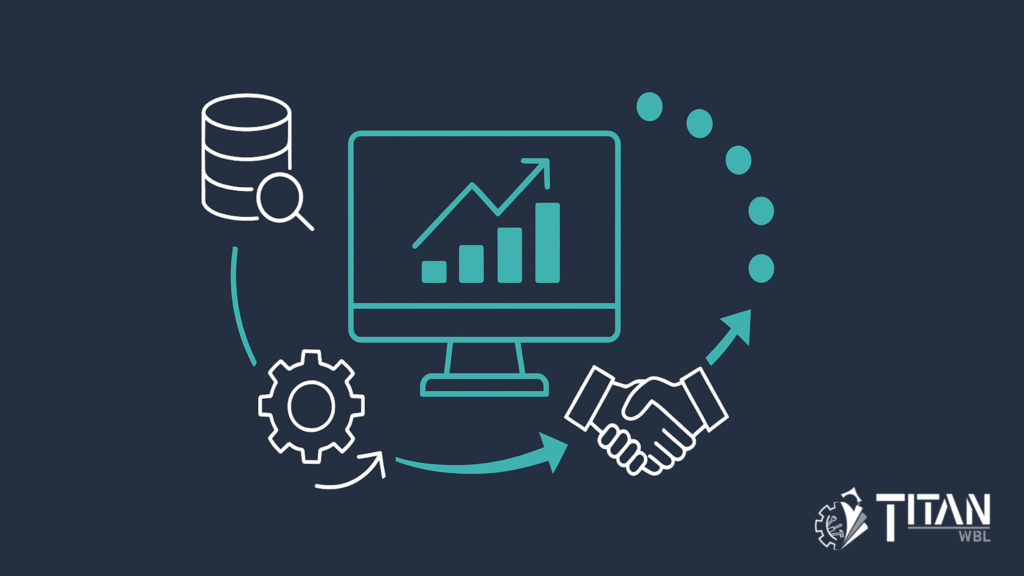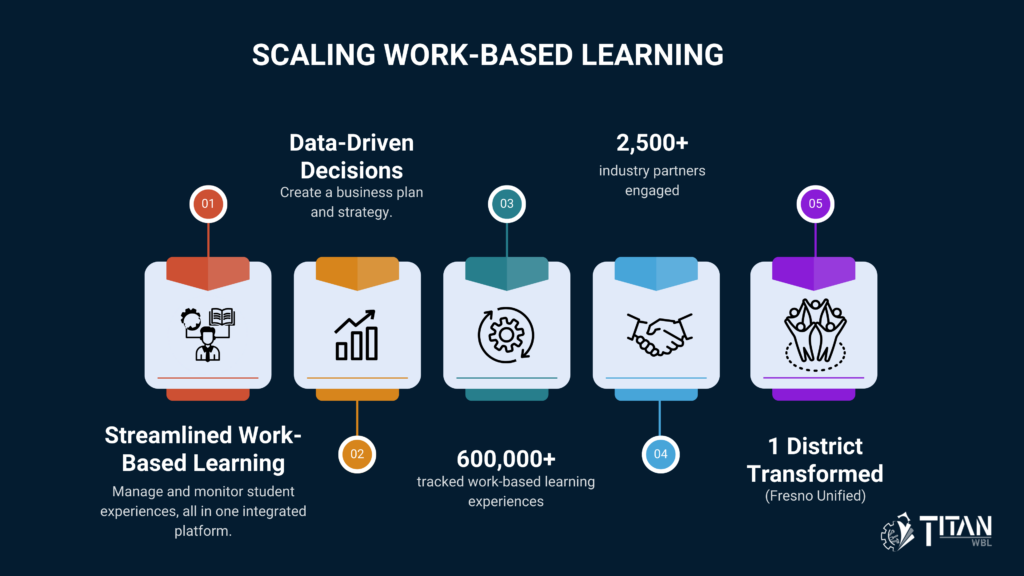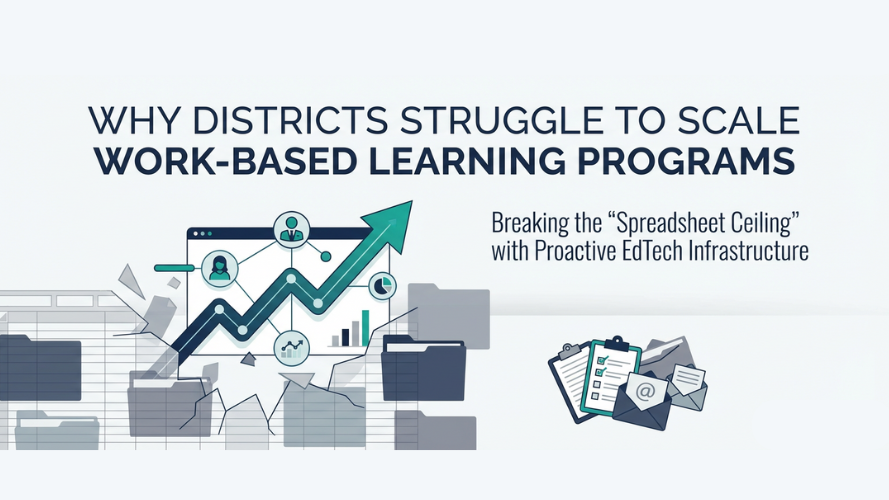Why Expanding Work-Based Learning Feels Impossible (Until You Centralize and Automate)
Every district wants to expand work-based learning opportunities, but few have the time, tools, or staff to make it happen. Career readiness directors and CTE coordinators often juggle thousands of student experiences, dozens of programs, and compliance reports, all while managing industry partners who need updates and documentation.
Without automation and centralized data, expansion quickly hits a wall. Spreadsheets multiply, emails get lost, and critical data like permits or dual enrollment participation live in separate silos.
Yet districts like Fresno Unified School District have proven that growth is possible… without hiring additional staff. With TitanWBL, Fresno scaled to 600,000+ WBL experiences and 2,500+ industry partners across more than 50 CTE programs, all managed through one unified system.
In this post, we’ll explore three actionable ways your district can scale career-connected learning efficiently:
- Centralize all WBL data and processes.
- Automate the manual work: permits, reports, and SIS sync.
- Build scalable, lasting industry partnerships.

Each step not only saves hours per week but also builds the foundation for equitable, districtwide access to work-based learning.
Table of Contents
1. Centralize Your Work-Based Learning Data and Processes
The first (and most powerful) step to expanding WBL is centralization.
Why decentralized WBL management limits growth
Many districts rely on a mix of Google Sheets, paper forms, and emails to track experiences. While this works for a single program, it breaks down as soon as you scale.
- Data lives everywhere: Coordinators can’t get a full picture of participation or equity.
- No standard reporting: Each site tracks experiences differently, making compliance reporting a nightmare.
- Limited visibility: District leaders can’t easily see which programs drive engagement or need support.
A decentralized system limits your ability to grow, because every new partner or program adds manual work.
The solution: A centralized WBL platform
A centralized system like TitanWBL gives districts one place to manage students, staff, partners, and experiences.
Key benefits include:
- Unified dashboards: See real-time participation and equity data across all schools.
- Compliance-ready reports: Generate reports for Perkins V, ESSA, and state metrics with a few clicks.
- Role-based access: Allow each user, from site coordinators to directors, to view what they need.
Instead of spending time gathering data, your team can focus on building quality partnerships and improving program outcomes.
Case in point: Fresno USD
Before TitanWBL, Fresno’s coordinators spent hours every week compiling spreadsheets and chasing signatures. Now, their centralized dashboard shows 600,000+ student experiences; instantly searchable by program, grade, or partner. That data isn’t just stored, it’s actionable.
District leaders can spot participation gaps, evaluate program effectiveness, and make informed decisions about where to expand next.
2. Automate the Manual Work: Permits, Reports, and SIS Sync
Centralization is the foundation; automation is the multiplier.
Even the most dedicated WBL teams hit capacity fast when tasks like generating work permits, syncing SIS data, or creating reports eat up hours every week. Automation frees up that time, without adding staff.
Automate work permits securely
Manual permit creation is one of the biggest time drains in CTE coordination. Collecting signatures, verifying data, and ensuring compliance can take 20–30 minutes per student. Multiply that by hundreds of students, and you’ve got weeks of lost time.
TitanWBL’s California Work Permit Generator automates the process while keeping student data secure (FERPA-compliant and no sensitive data stored on the server). Staff can generate, sign, and manage permits digitally, saving hours each week and ensuring no student misses an opportunity due to paperwork delays.
Sync with your Student Information System (SIS)
SIS synchronization eliminates double data entry. When student rosters, grades, and demographics automatically sync through Clever SIS integration, you can trust that TitanWBL always reflects the most up-to-date information.
This means:
- No manual uploads.
- No outdated rosters.
- Accurate demographic data for equity reporting.
As one director said after implementing TitanWBL, “We didn’t need another staff member; we needed our systems to talk to each other.”
Automate reporting and dashboards
TitanWBL’s Data Dashboards & Explorer turn raw data into instant insight. With custom dashboards and query builders, coordinators can quickly answer questions like:
- Which programs are generating the most internships?
- Are we meeting Perkins V indicators for participation and equity?
- How many students are on track for career readiness completion?
When reports update automatically, you shift from reactive tracking to proactive management.
3. Build Scalable, Lasting Industry Partnerships
The final lever for expanding WBL is partnerships, and not just more partners, but better-managed ones.
The challenge: Scaling partnerships without chaos
As programs grow, so does the partner list. Without a system, contact data gets outdated, agreements expire unnoticed, and outreach efforts stall. It becomes impossible to nurture 100+ relationships manually.
The solution: Centralized industry partner management
TitanWBL’s Industry Partner Management module helps districts manage every partner relationship in one place.
You can:
- Track partnership history and contacts.
- Record opportunities offered (job shadows, internships, mentorships).
- Match partners to programs and student goals.
- Automate renewal reminders and follow-ups.
This makes partnership management scalable, transparent, and consistent across the district.
Multiply engagement through advisory boards
Partnerships aren’t just about placements; they’re about collaboration. TitanWBL’s Advisory Board Management tool helps districts coordinate with local employers and postsecondary institutions, aligning programs with labor market needs.
By tracking board members, meeting outcomes, and follow-up tasks, coordinators ensure every advisory board meeting leads to real action, driving program relevance and student opportunity.
Real-world impact: Scaling without hiring
When Fresno USD scaled to over 2,500 industry partners, they didn’t add staff; they added structure. With automated communication, centralized records, and transparent dashboards, each coordinator could manage 10× more relationships effectively.
This level of scalability is what makes expansion sustainable.
Measuring Success: From Workload Reduction to Equity Impact
Expanding WBL isn’t just about numbers; it’s about outcomes.
By using centralized and automated systems, districts see measurable results:
- 50%+ reduction in administrative time spent on tracking and reporting.
- Faster placement cycles, allowing more students to participate each semester.
- Improved equity data, highlighting underserved populations and addressing access gaps.
- Higher partner retention, thanks to consistent communication and follow-up.
When data and processes flow seamlessly, coordinators can focus on what matters most: connecting students to meaningful experiences that prepare them for college and career success.
How TitanWBL Makes Expansion Possible Without Extra Staff
Here’s how TitanWBL combines all three pillars (centralization, automation, and scalability) into one seamless platform:
| Challenge | TitanWBL Solution | Result |
|---|---|---|
| Disconnected spreadsheets | Unified WBL tracking system | Complete visibility across schools |
| Manual work permits | Automated, compliant permit generation | Hours saved weekly |
| SIS & roster updates | Clever SIS sync | Always up-to-date student data |
| Reporting delays | Custom dashboards & query builder | Instant, accurate reports |
| Partner management chaos | Centralized CRM for industry partners | Scalable partnerships |
| Compliance risk | FERPA-compliant, role-based access | Secure, districtwide collaboration |
By combining these capabilities, TitanWBL gives districts the infrastructure to expand without expanding payroll.
Action Steps for District Leaders
- Audit your current WBL processes.
Identify where data lives, what’s manual, and where communication breaks down. - Calculate your time drain.
Add up the hours spent monthly on permits, data entry, and reporting, then imagine that time redirected to partnership growth. - Schedule a TitanWBL demo.
See firsthand how Fresno and other districts scaled from hundreds to hundreds of thousands of experiences without adding staff.
TitanWBL isn’t just software, it’s a strategic growth partner helping districts expand access, improve equity, and operate efficiently at scale.
Conclusion: Expansion Starts with Systems, Not Staffing
Districts everywhere face the same challenge: expanding work-based learning opportunities under tight budgets and limited staff. The truth is, scaling doesn’t always mean hiring; it means optimizing.
With centralized data, automated workflows, and scalable partnerships, you can:
- Reach more students.
- Strengthen community relationships.
- Maintain compliance effortlessly.
TitanWBL has proven it can help districts grow smarter, not harder, turning ambitious WBL goals into measurable outcomes.
If you’re ready to expand work-based learning opportunities without adding staff, now’s the time to act.




